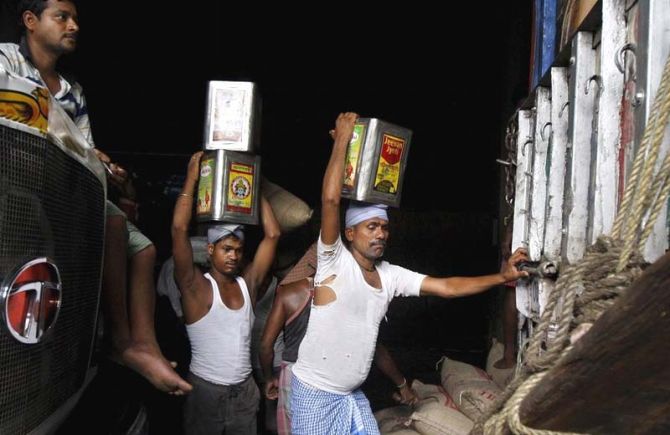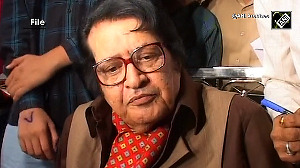
There's a whiff of consensus on scrapping 1% tax on inter-state goods movement, report Dilasha Seth and Arup Roychoudhury
A meeting between Union Finance Minister Arun Jaitley and his counterparts from the states on Tuesday resulted in some headway on the goods and service tax by reaching a broad consensus on dropping the proposed 1 per cent tax on inter-state supply of goods.
There was also consensus on keeping a cap on rates outside the Constitution amendment Bill, broad principles on the tariffs and categorical wording on fully compensating states for five years, in case of loss.
However, the disagreement between the Centre and states continued over administrative powers on assessment, scrutiny and adjudication of entities.
The issue of administrative powers would be dealt in the GST Bills, which would be introduced in Parliament only after the Constitution Amendment Bill is passed.
As such, there is a broad consensus on the provisions of the Constitution Amendment Bill, which is of immediate priority.
Kerala Finance Minister Thomas Isaac told reporters, “It was decided to drop the levy (one per cent additional tax on inter-state movement of goods).
"We were, of course, opposed to it. So were a lot of other states.”
The Constitution amendment Bill, as passed by the Lok Sabha in May 2014, sought to impose additional levy of up to one per cent over and above the GST to help the manufacturing states such as Gujarat, Tamil Nadu and Maharashtra, since the new tax regime would be destination-based.
However, this sparked fears that the levy would lead to cascading, tax on tax, since it would not be a part of the GST chain.
To balance the two sides, a select panel of the Rajya Sabha recommended dilution in the provision to limit it only to inter-state supply of goods for a consideration.
This means that company-to-company transfers would be out of this tax.
Talking to reporters after the three-hour long meeting chaired by Jaitley, chairman of the empowered committee of state finance minister and West Bengal Finance Minister, Amit Mitra said an agreement was reached that the cap on the GST rates cannot be incorporated in the Constitution amendment Bill.
“As you know, no tax rates are provided in the Constitution. It was discussed and the conclusion reached that the Union finance minister will communicate to other parties,” Mitra said.
States, however, stood firm on their demand that there should be a threshold of Rs 1.5 crore (Rs 15 million) of turnover a year for administrative powers on assessment, scrutiny and adjudication.
Below this threshold, states should have complete control, while there should be a dual control of states and the Centre above this.
“It is a unanimous decision of state finance ministers conveyed to the union Finance Minister,” said Mitra.
The states asked for the administrative threshold limit to be included in the GST Act.
Participants in the meeting said that Jaitley did not give any clear-cut assurance.
However, states were confident that the Centre will have to concede ground on the issue since the Opposition on the matter from the states was quite vehement.
“The Union finance minister heard the consensus,” said Mitra.
Experts too sided with states.
“It’s a rational decision to have a single-point administration for smaller dealers,” said Prashant Deshpande, partner, Delloite Haskins & Sells LLP.
The states were assured that for five years if there is any loss of revenue, centre would compensate.
“The wording which would guarantee five years of compensation was worked out,” said Mitra.
In the Constitution Amendment Bill, the Centre had proposed 100 per cent compensation for first three years, 75 per cent and 50 per cent for the next two years.
However, the Select Committee of the Rajya Sabha had recommended 100 per cent compensation for probable loss of revenue for five years.
The 'broad consensus put together is satisfactory to all political parties and all states,' Mitra said, adding 'foolproof' wording for compensation to states has been worked out.
INCHING FORWARD
While the Centre and states have reached broad consensus on a number of issues, some bones of contention remain
Agreed, broadly
- Dropping 1 % additional tax over GST on inter-state goods movement
- Cap on GST rate out of Constitution amendment Bill
- Principles of GST rate
- Categorical wording on compensating to states for five years in the Bill
Disagreed
- Administrative control over assessment, scrutiny and adjudication of tax cases
The image is used for representational purpose only. Photograph: Reuters












 © 2025
© 2025